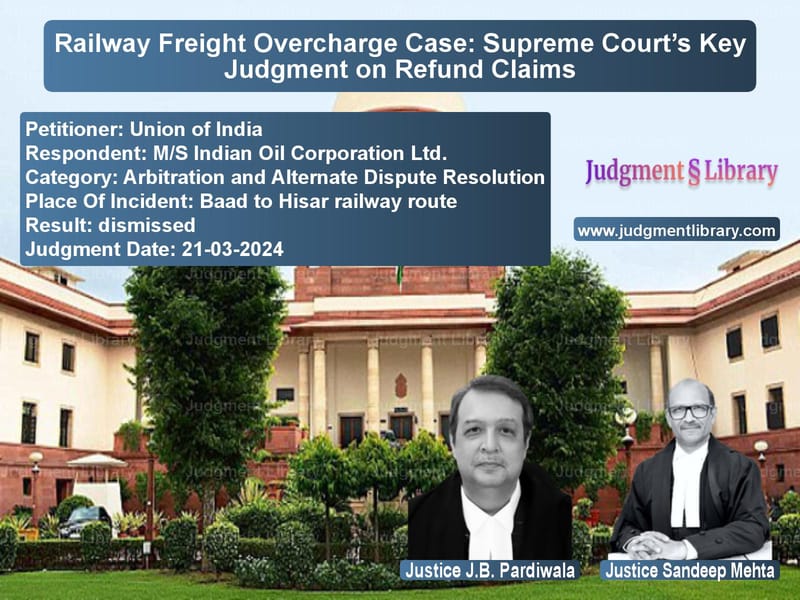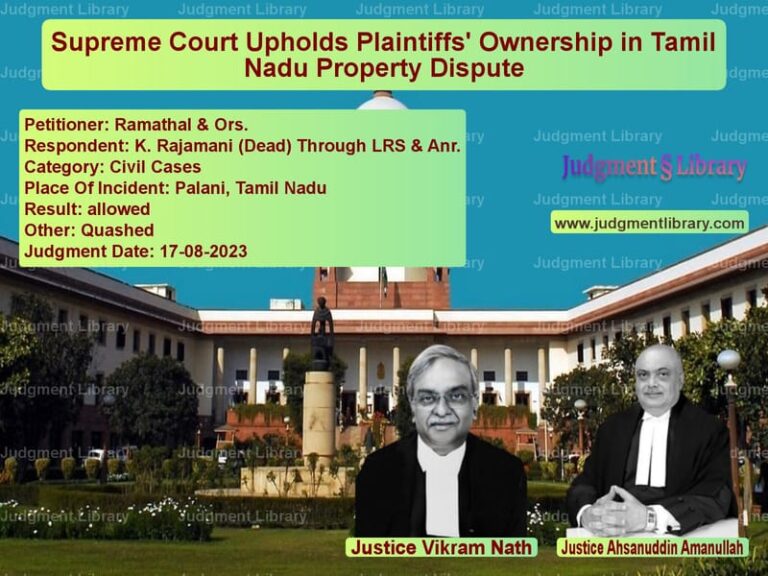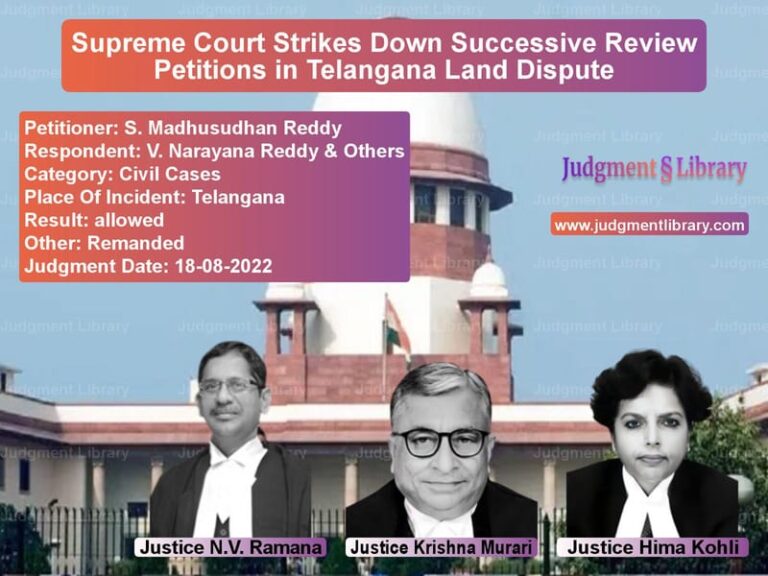Railway Freight Overcharge Case: Supreme Court’s Key Judgment on Refund Claims
The Supreme Court of India recently delivered a landmark ruling in the case of Union of India vs. M/S Indian Oil Corporation Ltd., addressing a crucial dispute related to excess freight charges levied by the Indian Railways. This decision sets an important precedent in cases concerning overcharges, illegal charges, and refund claims under the Railways Act, 1989.
The case arose when the respondent, M/S Indian Oil Corporation Ltd. (IOCL), discovered that the chargeable distance for transporting furnace oil between Baad and Hisar was incorrectly calculated as 444 km instead of the actual 334 km. This resulted in an excess freight charge, which IOCL sought to recover from the Railways.
Factual Background
The dispute originated when IOCL booked multiple consignments of furnace oil between 2002 and 2005 through the Indian Railways. The freight charges were determined based on a chargeable distance of 444 km as per the then-prevailing distance table. However, in 2004, the Ministry of Railways issued a notification revising the methodology for calculating chargeable distances. The revised methodology, which came into effect on January 1, 2005, corrected the chargeable distance for the Baad to Hisar route to 334 km.
Upon learning about the revision, IOCL investigated the matter and found that there had been no change in the physical track length between Baad and Hisar. The only modification was in the calculation method, which meant that the earlier distance of 444 km had been erroneous. IOCL subsequently submitted a claim under Section 106 of the Railways Act, 1989, seeking a refund of the excess freight charges it had paid due to the incorrect distance calculation.
Proceedings Before the Railway Claims Tribunal
IOCL initially filed 122 claim applications before the Railway Claims Tribunal (RCT), seeking a refund of the excess charges. During the pendency of the claims, the General Manager of the North Central Railway, after scrutinizing the matter, approved refunds for a limited number of claims that were made within the statutory time period of six months. However, the remaining 77 claims were dismissed by the RCT on the ground that they were time-barred under Section 106(3) of the Railways Act.
The RCT held that the excess charge was an “overcharge” rather than an “illegal charge,” and since the claims had not been made within the six-month limitation period prescribed under Section 106(3), they could not be entertained.
High Court’s Ruling
IOCL, dissatisfied with the Tribunal’s ruling, appealed to the High Court of Allahabad. The High Court ruled in favor of IOCL, holding that the excess charge was not merely an “overcharge” but an “illegal charge.” The Court relied on the Supreme Court’s decision in Hindustan Petroleum Corporation Ltd. v. Union of India, (2018) 17 SCC 729, where it was held that where an incorrect chargeable distance was applied, the excess freight collected constituted an illegal charge and not an overcharge.
The High Court concluded that since IOCL had paid freight as per a notified distance, which was later found to be incorrect, the refund claim was not subject to the limitation period prescribed under Section 106(3). It, therefore, directed the Railways to refund the excess freight charges within 12 weeks.
Supreme Court’s Analysis and Judgment
Aggrieved by the High Court’s decision, the Union of India approached the Supreme Court, arguing that the claims were time-barred and that the High Court had erred in treating the excess charge as an “illegal charge” rather than an “overcharge.”
The Supreme Court, after hearing both parties, framed three key issues for consideration:
- What constitutes an “overcharge” under Section 106(3) of the Railways Act, 1989?
- Whether the claim for refund in the present case pertained to an overcharge or an illegal charge?
- Whether the chargeable distance of 444 km was legally valid or not?
Distinction Between Overcharge and Illegal Charge
The Supreme Court examined the distinction between “overcharge” and “illegal charge.” It referred to previous judgments, including West Coast Paper Mills Ltd. v. Union of India (2004) 3 SCC 458, which clarified that an overcharge is a sum charged in excess of what is legally payable, whereas an illegal charge is a sum collected without authority or contrary to law.
Applying this distinction, the Court held that IOCL’s case involved an illegal charge because the chargeable distance of 444 km was never legally justified. The charge was not merely an error in calculation but an incorrect application of the distance table, which was later rectified.
Validity of the Chargeable Distance
The Supreme Court further examined whether the original chargeable distance of 444 km was valid. It found that the Indian Railways had itself revised the distance to 334 km upon a “critical review” of the distance tables. The Court noted that the revision was not due to a change in track length or route but rather due to a correction of an inherent error in the earlier calculation.
The Court observed:
“The chargeable distance of 444 km was an incorrect determination, which resulted in an unjustified excess freight charge. The subsequent correction to 334 km was not a policy change but a rectification of an error. Therefore, the respondent is entitled to a refund.”
Final Ruling
Based on the above findings, the Supreme Court dismissed the appeal of the Union of India, affirming the High Court’s order directing the refund of excess freight charges to IOCL.
Implications of the Judgment
The Supreme Court’s decision has significant implications for similar cases involving incorrect freight charges by Indian Railways:
- It clarifies that refund claims based on an illegal charge are not subject to the limitation period under Section 106(3) of the Railways Act.
- It reinforces the principle that Railways must ensure accuracy in its freight calculations and cannot unjustly retain excess amounts collected due to errors.
- It provides a legal precedent for companies facing similar issues of overcharging by government entities.
This judgment serves as a reminder to regulatory authorities and transport agencies to ensure fair and accurate billing practices to prevent unjust enrichment at the cost of consumers.
Petitioner Name: Union of India.Respondent Name: M/S Indian Oil Corporation Ltd..Judgment By: Justice J.B. Pardiwala, Justice Sandeep Mehta.Place Of Incident: Baad to Hisar railway route.Judgment Date: 21-03-2024.
Don’t miss out on the full details! Download the complete judgment in PDF format below and gain valuable insights instantly!
Download Judgment: union-of-india-vs-ms-indian-oil-corpo-supreme-court-of-india-judgment-dated-21-03-2024.pdf
Directly Download Judgment: Directly download this Judgment
See all petitions in Arbitration Awards
See all petitions in Dispute Resolution Mechanisms
See all petitions in Settlement Agreements
See all petitions in Institutional Arbitration
See all petitions in Commercial Arbitration
See all petitions in Judgment by J.B. Pardiwala
See all petitions in Judgment by Sandeep Mehta
See all petitions in dismissed
See all petitions in supreme court of India judgments March 2024
See all petitions in 2024 judgments
See all posts in Arbitration and Alternate Dispute Resolution Category
See all allowed petitions in Arbitration and Alternate Dispute Resolution Category
See all Dismissed petitions in Arbitration and Alternate Dispute Resolution Category
See all partially allowed petitions in Arbitration and Alternate Dispute Resolution Category







